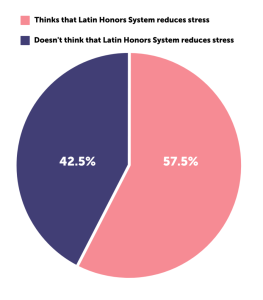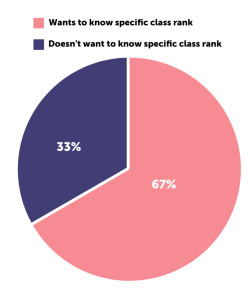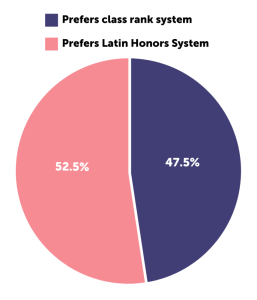The student race to the top of the class has transformed with students no longer being defined by a number. The proposal to remove the high school class rank system was voted by the Loudoun County School Board on Oct. 27, 2020, and is taking place for the first time this year with the Class of 2025. This decision follows Fairfax, Montgomery, Alexandria, and Prince William County schools.
The previous rank system is now replaced with the Latin Honors System, only recognizing students for their achievements in the top five, 10, and 20 percent and omitting titles of valedictorian and salutatorian. These categories are grouped into Latin honors distinctions as follows: Summa Cum Laude (top five percent), Magna Cum Laude (top 10 percent), and Cum Laude (top 20 percent).
The removal of a system that has been integral to the Phoenix community for the past ten years has sparked diverse opinions on whether this decision is truly for the betterment of the students.
The competition between students to perform their best academically has raised concerns amongst parents and administration on rising peer pressure and unnecessary comparison. The cause for excessive stress and the need for perfectionism has been traced back to the original system that ranked students based on their grade point average from the end of junior year.
The Rock Ridge counseling staff has helped students throughout the years with academics and college admissions, and has seen the impact on students firsthand. “I don’t necessarily think that [the original rank system] benefited students in any way,” counselor Ashlee Erestain said. “There’s a lot of comparisons [and] a lot of pressure put on students to be at the absolute top, when at the end of the day, it’s not about what rank in the class you are; it’s about your overall academic experience and what you did to have the best education possible to get into really great colleges.”
Many students sympathized with this and felt that the rank system determined their self-worth, leading to an overwhelming amount of pressure to be the best. “Kids have the urge to want to feel better than their peers and then end up putting too much pressure on themselves when really they shouldn’t be focusing on others; they should be focusing on themselves,” junior Aayan Repala said.
Senior Saanvi Movva, who is in the Magna Cum Laude distinction, the top 10 percent, agrees with the flaws of the system. “I think numerical ranks cause more stress [than GPA or SATs] because of seeing it in a number, like if you’re 100 out of 360,” Movva said. “I feel like different people would have different opinions and just hyper-fixate on it.”
To some, the removal of the rank system is a positive step forward in alleviating academic burden. “We hope that when we’re in a generalized type of ranking system, there’s not as much pressure,” Erestain said. “Nobody knows specifically what rank they are, so they’re not having to [think]: ‘I need one more class to boost my GPA just a little bit more to get better than this other student.’”
With such emphasis on grades during junior year of high school, the transition to the Latin Honors System has reduced some of the anxiety associated with getting perfect scores. “Personally, I think [the removal of the rank system] has made me feel better and less stressed out about school,” Repala said. “I don’t have to feel like I have to be better than everyone else, or I have to be better than my friends. And I also don’t have to worry about my friends knowing I’m a certain rank.”

Repala isn’t the only one who feels this way. According to a recent survey conducted at Rock Ridge with 200 responses, more than half of the students said they felt that the shift to Latin Honors System reduced their school-related stress and anxiety.
With less emphasis on rank, some students feel that they could have more freedom in choosing classes for a purpose other than a GPA boost. “I think it definitely increases course exploration,” senior Varunika Miryala, who is part of the Summa Cum Laude distinction, said. “I know for sure if there wasn’t such an importance on my rank, I would take easier courses or things that I’m more interested in than [things] that help me for my career path.”
However, the novelty of the original rank system and the ability to be recognized for achievements and hard work is something some students feel strongly about, especially in regard to what colleges see. “I did hope that people in higher levels could have a specific rank especially because it looks better in terms of college applications,” Miryala said. “I definitely do think that since I’m in the top five, I would like to know where exactly I am.”

In fact, the survey shows that an overwhelming 67 percent of students want to know what their class rank is.
Senior Rohan Matta, also Summa Cum Laude, resonates with this. “I think it would be nice for my rank to be officially recognized, since even if it wasn’t my main goal, it’s still something I earned over the last three years,” Matta said.
Predicting these objections, Erestain believes that ranks aren’t as important to colleges as students perceive them to be. “I don’t think it’s necessary to know a rank,” Erestain said. “I know a lot of the scholarships and some of the colleges say that it’s required when it’s actually not. If we tell the college that we don’t rank, they’re not going to require it from anybody. [Colleges] are looking at students holistically more than they ever have. They’re looking at your extracurriculars, they’re looking at the diversity of your courses, and they want to see something different for everybody. They can look at two students that have the same GPA, and they’re, like, ‘What does this even mean?’”
Regardless, some seniors still feel that the removal of the original rank system isn’t actually solving the problem of student stress because there’s still the same concept of competition. “Either way, I feel like the rank is still there, whether it’s specific or if it’s more general,” Miryala said. “People still work to be in a higher rank, so I don’t think it changes too much.”
Matta also agrees and feels that the uncertainty over where a student stands in academic performance leads to more pressure than before. “It’s more stressful for the people that might be at the edge of one section like the Summa Cum Laude or Magna Cum Laude because they don’t really know where they are, so they kind of just have to do their best, or they’re forced to stress about their grades,” Matta said. “I’m sure they can still try and improve their rank, but at least they would know that they don’t need to spend all their time on school, and they can also enjoy the rest of their time.”
According to some seniors, the removal of the rank system hasn’t stopped competition or peer pressure but has just added a barrier to students’ knowledge in figuring these details out. Seniors are still comparing their GPAs with others in order to figure out what their rank is. Not only does this add more stress trying to figure out how they’ve performed in relation to their peers, but it defeats the whole purpose of the Latin Honors System, as students still care about where they stand academically.
“People ask around for GPAs and manually figure out ranks anyways, so I would like for it to be more usable instead of just something that’s talked about,” Matta said. “You can get the Latin Honors System information from the original system, so why not give people more information about themselves?”
While not everyone is happy with this change, the removal of the rank system has redefined the concept of “Excellence in Education,” a term that has been fundamental to the academic competence at Rock Ridge. For the past ten years, Rock Ridge has celebrated and recognized students in the top five percent with an awards ceremony, banquet, and having their picture hung up in the entryway. These traditions will no longer exist with the elimination of ranks.
According to the Rock Ridge administration, the wall of excellence honoring the top five percent may be replaced with other forms of merit such as RISE awards that recognize students’ character or student of the month that rotates to expand the opportunities for more students to be included. As a result, the transition to the Latin Honors System may be a step forward in leaning away from purely grade-based recognition and more of a turn towards recognizing character development and growth in places other than solely academic performance.

When given a choice between the original class rank system and the Latin Honors System, students were fairly split between the two. However, by a small margin, the overall consensus from the 200 students surveyed is the preference of the Latin Honors System.
While the competitive nature of Rock Ridge may always stay, the transition to the Latin Honors System marks a change in academic attitude for the students. “We haven’t been in the Latin Honors System long enough to say what’s better than the other,” Erestain said. “I just hope that it can be embraced with an open mind by everyone. Success is about what you’re putting into it, not how much better you are than somebody else.”


























![The Phoenix varsity volleyball team lines up for the national anthem. “We were more communicative [with each other] during this game, and I feel like we kept our energy up, especially after the first set,” senior Jessica Valdov said.](https://theblazerrhs.com/wp-content/uploads/2024/10/DSC_0202-1200x800.jpg)









![Junior Alex Alkhal pitches the ball. “[I] just let it go and keep practicing so we can focus on our goal for the next game to get better as a team,” Alkhal said.](https://theblazerrhs.com/wp-content/uploads/2025/05/DSC_0013-1-1200x929.jpg)
























